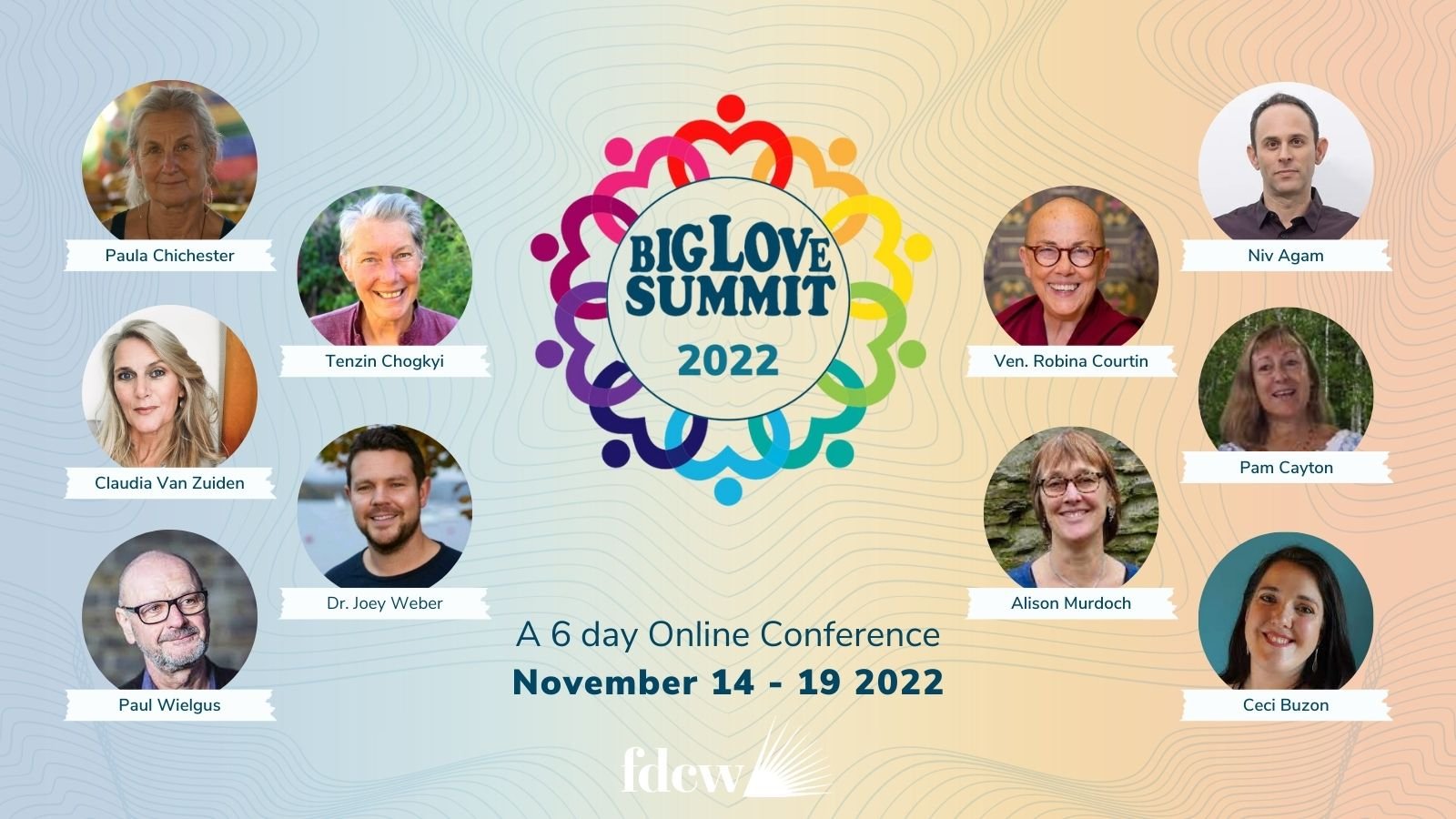Big Love Summit 2022
Big Love Summit 2022
FDCW hosted its third annual conference in November this year celebrating Big Love. After a successful series of six Compassion Webinars held throughout the year, we wanted to examine how can we open our hearts more fully; what biases and judgments separate us from others; how can we find pathways for more connection in our lives; and how can we deepen and strengthen our compassion while remaining joyful.
It all starts with our own mind. Paula Chichester opened the Summit with guidance on experiencing Love, Presence and Embodiment as a basis for developing our compassion. She said:
"Cultivate an inner landscape of nourishment, love and acceptance. Once we feel safe and connected, awareness naturally arises. Then genuine compassion can grow"
In Reclaiming Joy, Tenzin Chogkyi challenged the idea that spirituality is all about striving and pushing, never resting. If we skip resting, we quickly become joyless, even resentful. She led a meditation to show us ways to reconnect with our joy. She said:
"Use joy as a litmus test for your work to benefit others. If there's no joy, it's time to give yourself permission to rest."
In Embodying Loving Awareness in Difficult Times, Claudia Van Zuiden offered a life-affirming presentation, full of hope, sharing techniques for connecting with our heart and our true nature of love. When we forgive (ourselves and others) the heart softens - it is no longer tight. She asked:
"Can I let go of all the labels I have about myself and if I do, what is left?"
During Breathing In Equanimity, Dr Joey Weber said our compassion goes up or down depending on how the object of our compassion is relating to us. Equanimity can help us by relating to others in a healthier way and bringing more emotional balance. Equanimity is not just an intellectual idea, but has to be practised, familiarised, internalised, so you feel it and it heals you and others.
In Heart Practices for Difficult Times, Paul Wielgus offered a session rich in inspiration, practical advice and joy. He began by quoting Thich Nat Hanh on interbeing - we are all connected by the sheer fact of our human existence. He spoke of resonance - within our own heart, with one another and with mother earth. He shared a joyful video of children transforming a concrete parking lot in Oregon into a forest with fruit-bearing trees inspired by the Global Tree Initiative.
In Compassionate Activism, Ven Robina Courtin said wisdom begins in our own mind. It is the source of all our unhappy emotions. By recognising this, we can begin to feel compassion for ourselves. We can go beyond the narrow sense of self and realize we’re all in the same boat. This brings optimism and confidence that even the smallest action we can do to help others, counts. We develop the courage to never give up. All our actions, from lending a hand to our next-door neighbour to helping stop the destruction of our planet, need to be grounded in wisdom. As the Dalai Lama says:
“Compassion is not enough; we need wisdom.”
In We Are All One Family, Niv Agam, Ofir Levit and Mairan Broadbar from Dreamers Home (a non-profit in Israel) shared how FDCW's tools for wisdom and compassion are transforming the lives of people in Israel, especially those experiencing loneliness, living in poverty or struggling with sickness. We heard about the Jaffa Balcony – a place that brings together women from Christian, Judiac and Islamic traditions to share their common values and yummy food. The non-religious framework provided by FDCW’s 16 Guidelines proved essential for these women to explore values openly and without fear. Ofir said:-
"A pair of good eyes, a smile and a willingness to know the other person can be a seed of a true friendship."
In Spreading Joy and Gratitude in Your Community, Alison Murdoch offered a beautiful meditation on kindness. She described organising a week-long Kindness Festival in her hometown. Local people found all sorts of creative ways of sharing kindness from painting inspiring quotes about kindness onto rocks and scattering them around town, to knitting hearts and toys and leaving these to be "found" by children, from kindness assemblies in local schools to a public meeting debating kindness in politics. There was no budget or funding. And it all began with a few people sharing ideas over hot chocolate on a Sunday afternoon.
In The Power of Resiliency, Ceci Buzon identified the 16 Guidelines and its four wisdom themes as a key way to develop our resilience. We need to train ourselves to think in a more flexible, less rigid way. She explained the Giants and Dwarves game for children to learn flexible thinking. Can we see problems from several different perspectives? She emphasised the importance of focusing on what we can do to help rather than what we cannot do. This gives us courage and combats feelings of depression or overwhelm. Resilience brings us hope and lets our children feel hopeful too.
In We Are All Connected, Pam Cayton shared her 7 Steps program for awakening kindness in children. The first step involves a simple "centering" process where children go inside and ask deeply “What do I want?” What emerges is that we all want to feel happy and to be treated with kindness. This is the beginning of empathy - an understanding that if I want to feel happy, so do others. Then the "how" to be happy is explored. This involves feeling grateful for what we have and seeing how everything we enjoy is dependent on others. Pam shared ways that we can help children understand that our perceptions of the world are relative. How no-one can "make me angry". Nobody makes your emotions, you are in charge of your own emotions. She also spoke about the lost art of listening - how connection and communication feels good - deepening our empathy and developing our compassion.
To watch the presentations (in English, Potuguese, Spanish, Russian, Chinese, French and Italian), please visit our Videos page.

